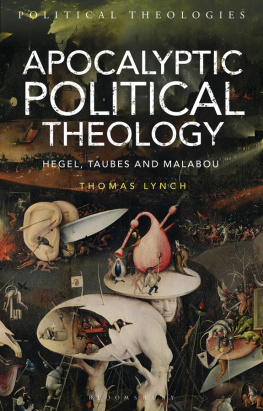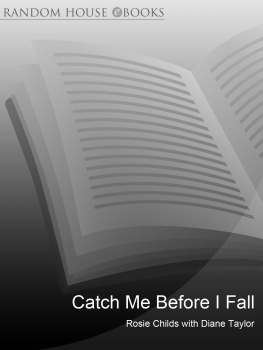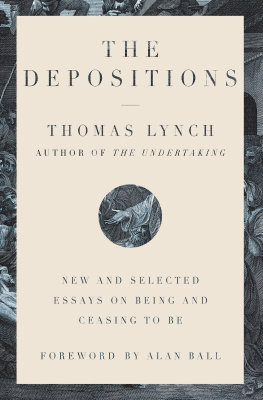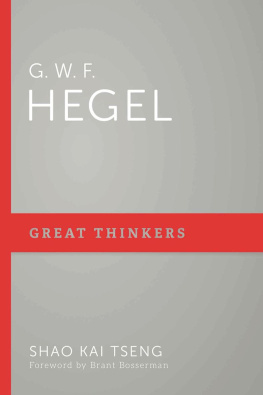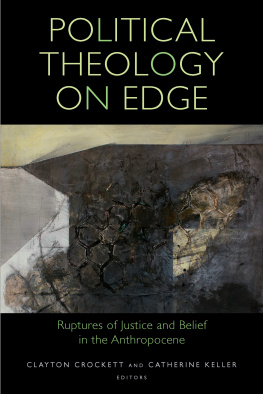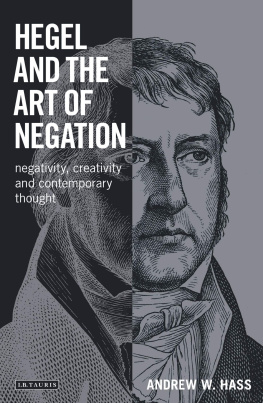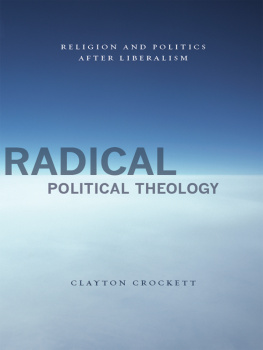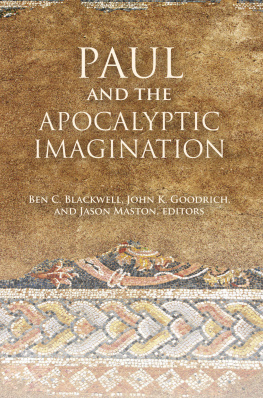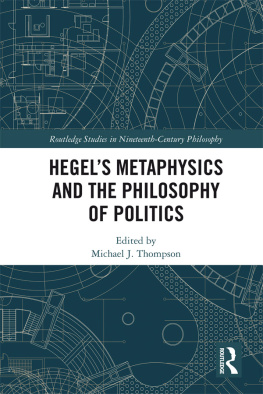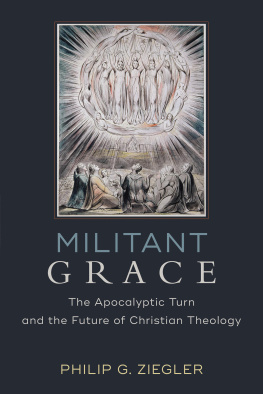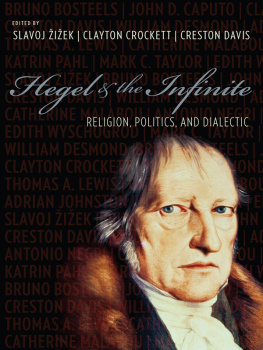
Apocalyptic Political Theology
Bloomsbury Political Theologies
Series edited by Ward Blanton (University of Kent), Arthur Bradley (Lancaster University), Michael Dillon (Lancaster University) and Yvonne Sherwood (University of Kent)
This book series explores the past, present and future of political theology. Taking its cue from the groundbreaking work of such figures as Derrida, Agamben, Badiou and iek, it seeks to provide a forum for new research on the theologicopolitical nexus including cutting-edge monographs, edited collections and translations of classic works. By privileging creative, interdisciplinary and experimental work that resists easy categorization, this series not only re-assets the timeliness of political theology in our epoch but also seeks to extend political theological reflection into new territory: law, economics, finance, technology, media, film and art. In Bloomsbury Political Theologies, we seek to re-invent the ancient problem of political theology for the twenty-first century.
International Advisory Board
Agata Bielik-Robson (University of Nottingham)
Howard Caygill (Kingston University)
Simon Critchley (New School of Social Research)
Roberto Esposito (Scuola Normale Superiore)
Elettra Stimilli (University of Rome La Sapienza)
Miguel Vatter (University of New South Wales)
Titles in the series
The Withholding Power: An Essay on Political Theology, Massimo Cacciari
Unnatural Theology: Religion, Art and Media after the Death of God, Charlie Gere
Modernity and the Political Fix, Andrew Gibson
Debt and Guilt: A Political Philosophy, Elettra Stimilli
Apocalyptic Political Theology, Thomas Lynch

BLOOMSBURY ACADEMIC
Bloomsbury Publishing Plc
50 Bedford Square, London, WC1B 3DP, UK
1385 Broadway, New York, NY 10018, USA
BLOOMSBURY, BLOOMSBURY ACADEMIC and the Diana logo are trademarks of Bloomsbury Publishing Plc
First published in Great Britain 2019
Copyright Thomas Lynch, 2019
Thomas Lynch has asserted his right under the Copyright, Designs and Patents Act, 1988, to be identified as Author of this work.
For legal purposes the constitute an extension of this copyright page.
Cover image: The Garden of Earthly Delights, 14901500 (oil on panel), Hieronymus Bosch, (c. 14501516) Prado, Madrid, Spain / Bridgeman Images
All rights reserved. No part of this publication may be reproduced or transmitted in any form or by any means, electronic or mechanical, including photocopying, recording, or any information storage or retrieval system, without prior permission in writing from the publishers.
Bloomsbury Publishing Plc does not have any control over, or responsibility for, any third-party websites referred to or in this book. All internet addresses given in this book were correct at the time of going to press. The author and publisher regret any inconvenience caused if addresses have changed or sites have ceased to exist, but can accept no responsibility for any such changes.
A catalogue record for this book is available from the British Library.
A catalog record for this book is available from the Library of Congress.
ISBN: HB: 978-1-3500-6474-4
ePDF: 978-1-3500-6473-7
eBook: 978-1-3500-6475-1
Series: Political Theologies
To find out more about our authors and books visit www.bloomsbury.com and sign up for our newsletters.
For Hannah
Contents
I am grateful to Paul Murray, Marcus Pound, Gerard Loughlin and the Centre for Catholic Studies at Durham University for their support and guidance and to Christopher Insole and Graham Ward for their feedback on early versions of this work. During this time I was exceedingly fortunate to have a supportive academic community that challenged me to think about this project from a variety of perspectives, including Roberto Alejandro, Tina Beattie, Andrew Brower Latz, Josh Furnal, Marika Rose and Susan Royal. I benefited from an opportunity to present my apocalyptic reading of Malabou at an interdisciplinary workshop at the University of Edinburgh. I am thankful to Michael ORourke for this opportunity and to Catherine Malabou for her remarks.
Liza Thompson was kind enough to listen to my ideas and encourage me to submit a proposal to Bloomsbury, and Frankie Mace patiently answered my endless questions. The conversations at the annual meetings of the International Network for Experimental Philosophy and Theology have been vital to further developing this project. I am particularly thankful for Jayne Svenungssons willingness to engage in lengthy discussions of the nature of political theology and apocalypticism. At key moments in the development of the first and last chapters, Amaryah Armstrong, Daniel Colucciello Barber and Alex Dubilet were generous enough to engage in conversation, provide feedback or share their own work.
The last stage of preparing this book coincided with taking up a position at the University of Chichester. The many discussions I have had with colleagues there have provided great opportunities to think about the connections between religion, politics and philosophy. I am especially grateful to Ruth Mantin, Benjamin Noys, Stephen Roberts and Graeme Smith. I also benefited from a University of Chichester Research Development Award that provided the time to finish writing.
Though academia can sometimes feel like a solitary pursuit, one of its great joys is forging relationships with people who push you in profound ways and shape the way you think. Though they do not always share my conclusions, whatever is of value in the following work has been shaped by Michael ONeill Burns, Mark Mason, Ulrich Schmiedel, Anthony Paul Smith and Hannah Strmmen. Words cannot express how much their friendship and support has meant over the years of trying to figure out what it means to think the end of the world.
Finally, I am grateful to my parents, who have always encouraged my desire to pursue my love of philosophy, and to my wife, Hannah, who has been my partner in this research, as in everything.
Hegel
All citations give the page number of the English edition first, followed by the German.
| E13 | Encyclopedia of the Philosophical Sciences, 3 Volumes |
| The Encyclopaedia Logic: Part I of the Encyclopaedia of Philosophical Sciences with the Zustze. Translated by T. F. Geraets, W. A. Suchting, and H. S. Harris. Indianapolis, IN: Hackett, 1991. |
| Hegels Philosophy of Nature: Part Two of the Encyclopaedia of the Philosophical Sciences (1830): with Zustze, translated by A. V. Miller. Oxford: Clarendon Press, 1970. |
| Hegels Philosophy of Mind: Part Three of the Encyclopaedia of Philosophical Science (1830) with Zustze, translated by A. V. Miller. Oxford: Clarendon Press, 1990. |
| Enzyklopdie der Philosophischen Wissenschaften im Grundrisse (1830). Werke, 810. |
| ETW | Early Theological Writings, translated by T. M. Knox. Philadelphia: University of Pennsylvania Press, 1996. |
| Frhe Schriften. Werke 1. |
| LPR | Lectures on the Philosophy of Religion, translated by R. F. Brown, P. C. Hodgson and J. M. Stewart, edited by Peter C. Hodgson. 3 vols. Oxford: Oxford University Press, 2007. |

